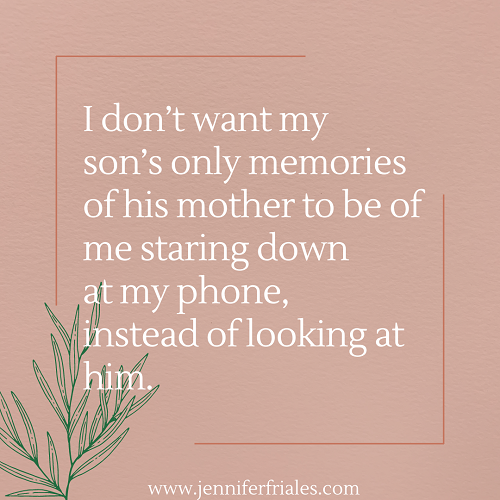
Screen Time Reality Check: Create Lasting Memories With Who Matters Most
I don’t want my son’s only memories of his mother to be of me staring down at my phone, instead of looking at him.
The main floor of our house is split into two levels separated by three sets of three steps. My son’s favorite spot to play is the set leading into the living room. After breakfast is eaten and dishes put away (or left sitting on the kitchen table, let’s be real) he grabs my hand, pulling me to sit beside him on the stairs.
He practices climbing, stepping down, and standing behind the railing looking at me through the bars. This is where he pulls out all his toys, dumping them in a pile at the foot of the stairs, a no-man’s-land of hazardous footing.
In my spot on the stairs, I hold foam baseballs, toy cars, and big legos, sipping my second cup of coffee for the morning. It’s both a necessity to continue waking up a tired Mama and a tool to keep my hands occupied.
You see, while I genuinely love playing with my son, my phone stays on the kitchen table within earshot, but not close enough to pick up without a thought. Holding my steaming (lukewarm) coffee my fingers itch to play the game that’s captured my attention of late, to check Instagram stories again for something new, or to turn on a podcast to distract me from the slow ticking of the clock.
I don’t remember exactly which podcast I heard about the concept. The discussion veered toward phone usage and just as my brain wanted to check out of the conversation the guest said something I’m still thinking about months later. They said the truth is many of today’s children’s early memories of Mom and Dad will be of them staring at the screen of their phone, rather than looking their child in the face.
What are we teaching them?
What I didn’t understand before becoming a parent is how perceptive children are to what truly matters in their home. By that I mean, the things given the most attention by their parents are the things those kids learn to value.
We value items such as the television, our computers, the very walls of our home, or the new rug in the living room. How do our kids learn these things are important? Because we spend time staring at them, interacting with them, or ignoring our kids’ bids for attention to continue on with whatever it is we’re doing on the screen.
I tend to get wrapped up in games on my phone. It becomes part of the routine to spend some time playing on it when I have a moment of down time, and there’s nothing wrong with pulling out the game or scrolling social media when you finally get that bathroom break you’ve needed for the last hour.
It becomes a problem when all you can think about during the ‘quality time’ you set aside to be with your children is the game, the show, the work. When whatever that thing is that consumes your attention becomes all you can think about, it’s time to make a change. It’s time to set it down and walk away for a little bit. It’s time to think about the implications of our actions and the lessons we’re unintentionally teaching our kids about what we value in our houses.
A few lessons our kids are learning from our screen behavior are:
- • It is not okay to be bored or to let my mind be free of distraction to wander aimlessly.
• I must always be connected to or available to the outside world.
• It is okay not to pay attention when people talk to me.
• This moment doesn’t matter unless I post about it when it happens on social media.
Worst of all, our kids learn this small, light-up rectangle is more important to Mom and Dad than anything else, anyone else.
More Important Than Me
Even if those weren’t enough reasons to limit my phone usage during the day, constantly looking at or checking my phone when I’m supposed to be spending quality, one-on-one time with my son, I’m communicating a tragic message to his little heart. He’s not as important to me as my phone is. Think about how damaging that message is to a young child’s mind, believing their parents are more concerned with their phone than with them.

Each time I pause our play to check a notification, to respond to a text message right away, or to play a game, I’m showing my son that I cannot be still. I cannot be unconnected to the outside world. I cannot focus and pay attention to the person in front of me. I don’t care about the moment right in front of me.
In 2020 we saw our screentime habits nearly double what they were before the lockdown. An article by Rochi Zalani said, “Most people check their phones 58 times a day.” These phone checks are typically 1 minute and 15 seconds long. By the end of the day the number of phone checks and time spent looking at them adds up to about 3 hours and 27 minutes.
It’s not just our kids, but our spouses and friends and coworkers and family. When I get sucked into a game in the evening when I should be enjoying child-free time with my husband, I can’t focus on anything else. I can’t focus on what he’s saying, what’s playing on the tv, or what time it is. I am so sucked into the game or social media that I can’t remember how tired I am and that I need to go to bed.
What to do about it?
Here are four simple steps to focus on the relationships that matter most:
1. Leave your phone in a different room while your kids are awake. Turn on the ringer and turn off the notifications for all of the apps that send unimportant, distracting notifications. If someone needs to get in touch with you, they’ll call.
2. When you allow phone or tv time, for you or your kids, set a timer. While the timer is running, give yourself permission to enjoy your phone, the episode of Winnie the Pooh or Mickey Mouse Clubhouse (two fan favorites at our house). When the timer goes off, simply put your phone away or turn the tv off. Communicate with your kids what the timer is for and why you’re using it.
3. In the evenings, put your phone in a different room 30 minutes to an hour before bed. Spend quality, one-on-one time with your spouse doing what you love to do. My husband and I love to watch sit-coms and reality tv shows, put a 1000-piece puzzle together on the kitchen table, or spend time doing things we each love individually.
4. Go for a walk in the evening after everyone is home, leaving your phones in the house. I have found that walking side by side opens the doorway to conversations we wouldn’t normally have looking each other in the face. It’s easier to tackle hard subjects when there’s ample room to breathe outdoors.
I want to teach my son that some of his best ideas will come from boredom, to appreciate a sunset without snapping a picture of it, and to enjoy the company of others without being tethered to social media to make it meaningful. What lessons do you want to teach your kids? Tell me in the comments below!





2 Comments
Sarah Yates
What a great reminder for us parents – to put the phone down and focus on what matters. These years are so precious, and I want to make sure I am soaking up every minute of it.
Jennifer Riales
Exactly! It seems so simple, but it’s so hard to put into practice. I hope you find grace on your journey!